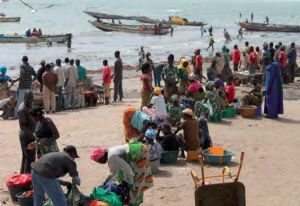
Beach landing and trading, Gambia. Source: UNCTAD 2014.
From sardines and mackerels to cockles and oysters, the fisheries and fish processing activities of the Republic of the Gambia in West Africa are important to people and to the economy. A new report by the UN Conference on Trade and Development (UNCTAD), called “The fisheries sector in the Gambia: trade, value addition and social inclusiveness, with a focus on women,” examines the fish trade and gender linkages. In particular it discusses the complex issues around domestic markets and trade and export supply chains which can “accentuate dynamics of polarization and exclusion.” The domestic-oriented chain is most important to women.
Download the report here
Executive Summary (extract):
The relationship between trade and gender is highly contextual and country-specific, as the gender effects of trade depend on the specificities of individual economic sectors and countries. However, it is at times possible to extrapolate some general patterns that are likely to be found across countries. In general terms, The Gambian case study points to three critical dimensions that should be taken into account when promoting fish-export-oriented policies as a pro-poor strategy: i) the existence of gender-specific patterns in the processing and marketing of fresh and cured fish products; ii) the resultant, gender-differentiated impacts of a commercial, export-oriented strategy in the fisheries sector; and iii) the need for trade policy responses that are gender-specific and redistributive.
This entry was posted in: Freshwater Fisheries, Gender, Marine Fisheries, Men, Women
